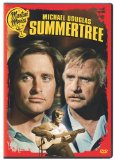| Reviews & Columns |
|
Reviews DVD TV on DVD Blu-ray 4K UHD International DVDs In Theaters Reviews by Studio Video Games Features Collector Series DVDs Easter Egg Database Interviews DVD Talk Radio Feature Articles Columns Anime Talk DVD Savant Horror DVDs The M.O.D. Squad Art House HD Talk Silent DVD
|
DVD Talk Forum |
|
|
| Resources |
|
DVD Price Search Customer Service #'s RCE Info Links |
|
Columns
|
|
|
Summertree
I know I've written this before, but I do not "get" Sony's whole Martini Movies line of DVD releases - particularly with the two Vietnam-era youth pictures released under that label which I'm reviewing this week: Robert Mulligan's The Pursuit of Happiness and Anthony Newley's Summertree. On the back of the DVD case, Sony has printed up what I assume is the mission statement of their Martini Movies brand: "No matter the decade, there's a place where icons, idols and the infamous flock for bottomless martinis and over-the-top trysts. One part top-shelf martini, two parts celluloid history, and garnished with a hint of camp. Sit back and take in the scene...." Now...what the hell does any of that phoney marketing crap have to do with - in even the most remote, tangential way - a film like Summertree? No one starring in it is an icon or idol, nor are their exploits particularly infamous (neither the stars nor the characters they play). No one drinks martinis (the mood of the film is about as "anti-martini" as you can get), and none of the trysts are in any way, "over the top." Neither is Summertree particularly "camp," and it's certainly not "celluloid history," that is for sure. I rant because this Martini Movies has been annoying the hell out of me for years now, and enough is enough. It's not working, Sony. As for the movie itself, Summertree doesn't particularly work, either...so maybe it is a perfect fit for Sony's faux-hipster brand.
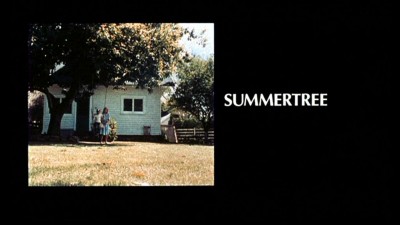
At the height of the Vietnam War, 20-year-old Jerry (Michael Douglas) is sitting out the conflict at college, studying a degree he doesn't believe in (sociology) while putting in serious time with his guitar. Returning home during break, Jerry's insurance salesman father (are you starting to see the symbolism of the play this film was based on?) Herb (Jack Warden) isn't exactly happy with Jerry's wandering focus, but it's clear he loves his son and wants what's best for him...even if he thinks Jerry doesn't know himself what's best for him. Returning to school but skipping registration, he instead joins the Big Brother organization and tries to reach out to an angry, foul-mouthed, racist African-American kid named Marvis (Kirk Callaway). This proves difficult at first, but easy-going Jerry's intrigued by Marvis' refusal to "get with the program," so he sticks with him (Jerry no doubt admires in Marvis what he himself doesn't possess: a strong, rebellious nature). Through an accident with Marvis, Jerry meets nurse Vanetta (Brenda Vaccaro), and the two begin a sweet romance. But Vanetta has a secret that complicates Jerry's own decision to drop out of college - a decision that will have dire consequences when he's classified 1-A for the draft.
MAJOR SPOILERS ALERT!
Based on the Broadway success by Ron Cowen (of Queer as Folks fame), Summertree is a curiously neutered amalgamation of the Vietnam protest and "youth picture" genres that were specific to this 1970 time period (and over which the major studios obsessed, hoping to cash in on the counterculture like Easy Rider), and the more standard coming-of-age romance/generation gap genre. Enervation masquerading as sweetness and ultimately melancholy and shock, Summertree suffers not only from a director who can't find the pulse of the drama, but also from a lead character whose obvious foolishness feels contrived strictly for the sake of engineering a faux sucker-punch ending.
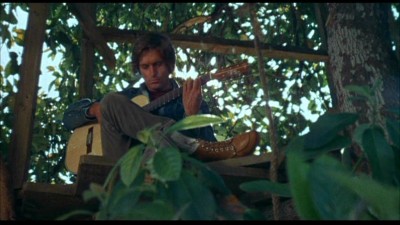
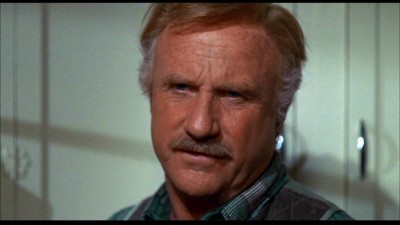
Right off the bat, Summertree starts on a strange note, with a credit sequence that features sped-up home movie slapstick married to an icky, syrupy theme song. Is this going to be a comedy, we might wonder? Not at all, it turns out (particularly when you discount the very brief appearance of Rob Reiner as a scheming hippie friend of Jerry's - he's not funny). I suppose the screenwriters (one of them being Edward Hume, a well-respected television writer who worked on Douglas' The Streets of San Francisco, as well as Cannon and that neglected sleeper, Toma) meant for the sequences with Jerry and the obnoxious Marvis to be amusing, but they're more clichéd and embarrassing than humorous (the minute Marvis goes to speak, we just know we're going to be required to find his racist vulgarity cute and adorable - something of course that would not have been tolerated had Marvis been white). As for Jerry's romance with Vanetta, it's the most successful element of the picture, particularly when the marvelous Brenda Vaccaro is on screen (why didn't she have a larger career on the big screen?). Her chemistry with Douglas goes a long way towards generating some mild viewer interest for the essentially passive sociologist/guitar player/searcher Jerry.
Once Vaccaro's marriage is revealed, and Jerry discovers her husband is coming back home (a husband from whom she's been separated for two years while he fights in Vietnam), Summertree starts to look like a fairly conventional drama - but at least one that's going somewhere. Prior to the arrival of husband Tom (played far too briefly by the excellent Bill Vint, of Macon County Line fame), Jerry's central malaise is never given proper emphasis so we can care about what happens to him in the story. Douglas, a veritable blank at this early stage of his career, can't inject much subtext to the role; he rather comes off as a clueless, somewhat callow youth who drifts along "not feeling anything," as he states. Now, that may not sound like a promising core for a lead character, but it can be if the script takes advantage of that situation, or if the actor is skilled enough to create an intriguing element to that "blankness." But such work is beyond the scriptwriters here, and Douglas. So when the element of Vanetta's dishonesty is introduced, the viewer is finally wondering if Jerry is actually going to do something in the film to keep our attention.
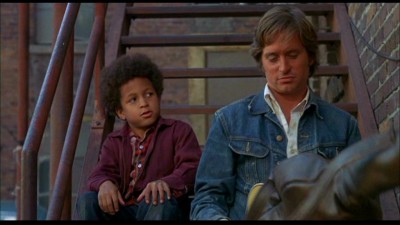
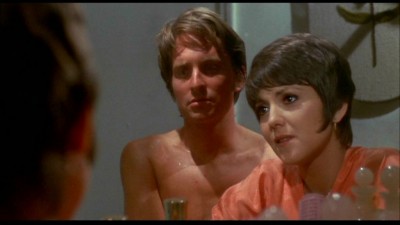
Alas, that isn't the case. He "forgives" Vanetta unconditionally, and we're back to the "war protest" subplot where Jerry's foolish, nonsensical decision to drop out of regular college on the chance of getting an invitation to study at a conservatory seems more the work of a scribe looking for convenient irony and a pat "meaningful" ending rather than believable drama. Indeed, what are we to think of Jerry - essentially a cipher already at this point who freely admits to not being able to decide "yes" or "no" in any important situation - when he refuses to follow the advice of friends and family who warn him of the consequences of his actions? Even his father, when he discovers Jerry's plan, advises him to puncture his eardrum - anything to avoid going to war. Yet the final act of the film illogically subverts that father character and turns him into a benevolent monster who tries to sabotage Jerry's run for the Canadian border when push comes to shove. Why? Herb has always been portrayed as sympathetic throughout the film, even if he doesn't quite understand his wayward son (Jack Warden is, as he always was, solid as a rock here). Why turn him into a bastard who wants to pay a mechanic to monkey-wrench Jerry's car so he can't escape to Canada, when before, Herb told him to puncture his eardrum to avoid going to war? Neither act is particularly "noble" in the truest sense (running away or self-inflicted injury), but they both achieve the same ends: no war.
The reason for the switch becomes obvious in the final Twilight Zone-like sequence where Herb and Ruth (Barbara Bel Geddes, in an almost invisible role) begin to make love, turning off the war news right when an image of Jerry's wounded body appears. As the vacuum tube glows out, we're made to understand (and how could we not with that heavy-handed symbolism), that Jerry's bulb has burned out, too. I imagine all involved thought this ending would shatter the audience, but it's so telegraphed to begin with (we get it when Herb ponders cutting down Jerry's tree and tree house), and poorly executed, as well (Douglas looks ridiculous feigning a mortal wound), that the combined effect only heightens the contrived nature of the scene's inherent dramatic structure. Worse, we never see the transition between Jerry's discovery of his father's impromptu plot, and Jerry's decision to go to Vietnam. Did he go willingly? Passively? Was he hauled off in handcuffs? Couldn't he have gone "underground" with all those friends of his? Why did Jerry go when he swore he wouldn't go to Vietnam (the first and only time Jerry showed any true passion in the film)? We never know, and if the filmmakers thought they were being trendily "open-ended" about that finale in 1970, it doesn't play that way now. Now, it just looks like lazy screenwriting. And without that crucial context to Jerry's final decision, in the end, Jerry's death fails to move us; it comes across as merely a parlor trick - and a trick for a character that we never really believed, or believed in, in the first place.
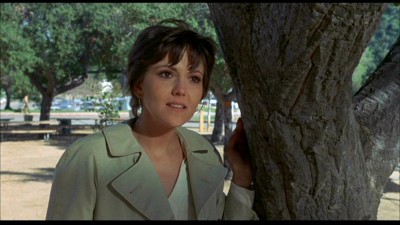
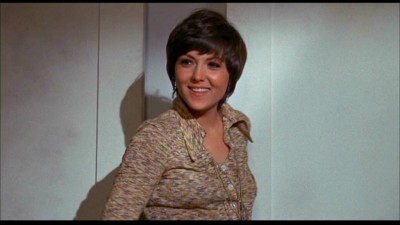
The DVD
The Video
Summertree looks fantastic in an almost blemish-free, anamorphically-enhanced, 1.85:1 widescreen transfer. Colors are beautifully modulated, and the image is sharp (with only minimal grain, as expected). No compression issues, either. It looks like it was shot yesterday.
The Audio
The Dolby Digital English mono audio track is entirely in keeping with this largely dialogue-driven film. All words are heard crisply and cleanly, and hiss is at a minimum. English subtitles and close-captions are included, as well.
The Extras
There are some trailers for Sony DVD collections included with the original theatrical trailer for Summertree (which is made to look like a Disney musical).
Final Thoughts
Not at all successful in either exploring the existential wanderings of a dispassionate college student, nor at exploring the tensions that existed during the height of the Vietnam War - particularly those between family members and loved ones. Summertree adds up to very little, with lead Michael Douglas unable to bring much interest to his enervated lead character. A rental only if one is interesting in catching Brenda Vaccaro or Jack Warden, both of whom are very good in this slight drama.
Paul Mavis is an internationally published film and television historian, a member of the Online Film Critics Society, and the author of The Espionage Filmography.


|
| Popular Reviews |
| Sponsored Links |
|
|
| Sponsored Links |
|
|
| Release List | Reviews | Shop | Newsletter | Forum | DVD Giveaways | Blu-Ray | Advertise |
|
Copyright 2024 DVDTalk.com All Rights Reserved. Legal Info, Privacy Policy, Terms of Use,
Manage Preferences,
Your Privacy Choices | |||||||









